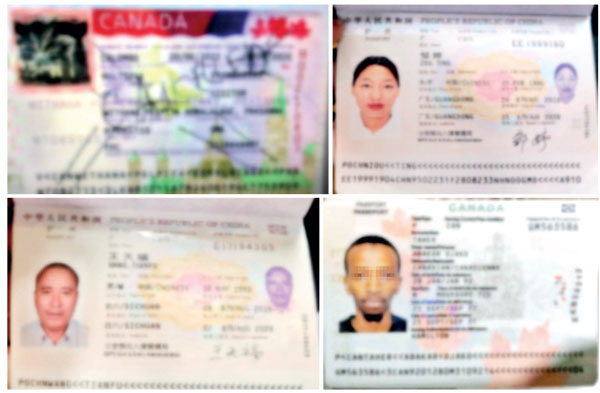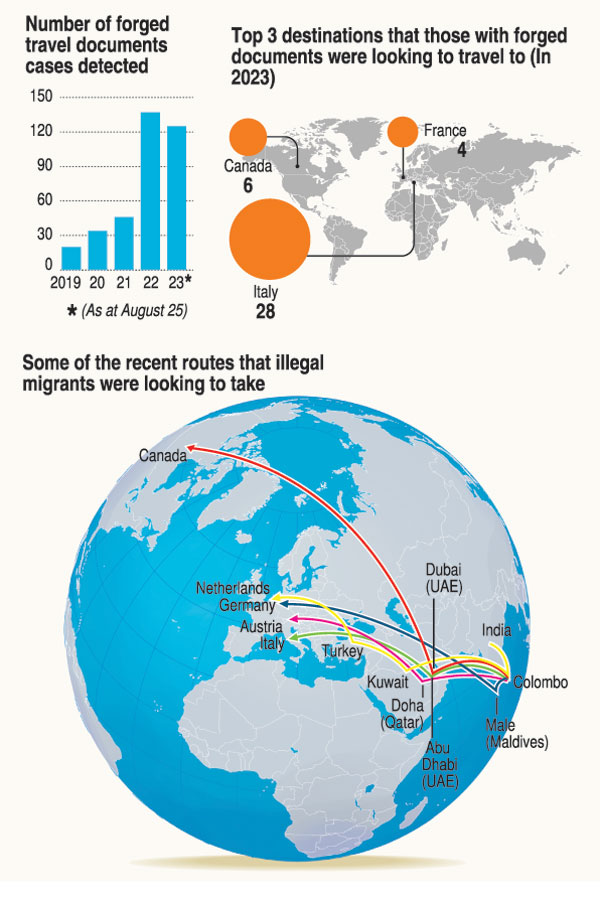News
Illegal migration on the rise, authorities scramble to act
View(s):- Detected cases reveal both forged and genuine documents are used by illegal migrants
- Racketeers profit from people’s desperation to migrate; most attempts end in unpleasant consequences
- Immigration officials at airport work in coordination with embassy officials
By Sandun Jayawardana
Amid a sharp rise in illegal migration attempts due to the economic crisis, immigration authorities are warning people not to be deceived by racketeers who are seeking to profit from their desperation.
On Wednesday, the Immigration and Emigration Department’s Border Surveillance Unit (BSU) officers arrested a suspect who tried to travel to Canada via Dubai using a forged Canadian visa. The suspect was identified as a 32-year-old chef from Piliyandala. It was later revealed that he had paid Rs. 4.5 million to a middleman to obtain the forged passport. This was the latest in a series of recent detections of people trying to migrate illegally. In two separate incidents on July 31 and August 2, immigration authorities arrested seven people from the Northern Province while they were attempting to travel to Italy using forged travel documents.

BIA detection: Pictures of passport pages that had forged Canadian and Indian visas. Pix by T.K.J.Kapila
It is not only Sri Lankans who have been caught. Several foreigners have also been arrested at the BIA in recent days during illegal migration attempts. These include an Indian couple who attempted to travel to the Netherlands on forged passports and a Chadian national who had arrived in the country using a forged Canadian passport.
The BSU has detected 125 cases so far this year of people attempting to travel using forged documents. There were 137 such cases in 2022, a sharp increase from the 46 detected in 2021.
The BSU has handed over 89 people with forged travel documents to the Criminal Investigation Department (CID) for further investigations.
There are many different methods that are being used for human smuggling attempts, said P.P. Aluthge, the BSU’s Chief Immigration Officer. Some produce their genuine Sri Lankan passports and travel documents to officers at the immigration counter.
“They will have a visit visa to destinations such as Dubai, Malé, Thailand, or Malaysia. It will all be perfectly legal. But they will also have a separate, forged passport and travel documents hidden with them, which they will use after disembarking to board flights to their ultimate destinations.
“We have detected people with forged passports, visas, and PR (Permanent Residence) cards. Our officers are skilled at detecting such documents, and we also have good technical support,” said Mr. Aluthge.
He said the BSU has close relations with various agencies, including the United Nations Office on Drugs and Crime (UNODC), the International Organisation for Migration (IOM), and the Colombo-based foreign missions of the US, Australia, Canada, Switzerland, and other countries. This has helped in providing local and foreign training to immigration officers and obtaining the technology needed to better identify forged documents. In addition, various embassies have posted Airline Liaison Officers (ALO) at the BIA to assist immigration officers. In the case of the chef who was caught with the forged Canadian visa, the ALO of the Canadian High Commission was on hand to provide confirmation that the visa was forged.
Given that Sri Lankan authorities have been more successful at stopping boats with large groups of illegal migrants setting out from the country, some human smugglers are now sending people to other countries in the region from where boats are leaving. This was the case with the Myanmar-flagged “Lady R3,” which was carrying 303 Sri Lankans when it got into difficulties about 258 nautical miles off the southern Vietnamese town of Vung Tau in November last year. The group was rescued by Vietnamese authorities on November 8. At the time it got into distress, the vessel had been making the dangerous 6,000-nautical-mile journey from Myanmar to Canada.
In the months following their rescue, Vietnam has repatriated more than 170 of the rescued illegal migrants to Sri Lanka. Through their interviews, local authorities have established how such a large group managed to move to Myanmar before taking a boat to try and travel to Canada. It has now been revealed that the illegal migrants had travelled to Myanmar legitimately on their own passports and then travelled individually or in groups of two to three on different flights over several months. They then stayed in Myanmar until their boat was ready. Each of them had paid between USD 4,000 and 5,000 to people smugglers for the trip.
There are clear differences between human smuggling and human trafficking. Human trafficking involves the recruitment, movement, or harbouring of people for the purpose of exploitation, such as sexual exploitation, forced labour, slavery or organ removal, according to the UNODC. Human smuggling, in contrast, takes place across borders. It involves assisting migrants to enter or stay in a country illegally for financial or material gain.
Mr. Aluthge noted that there have been recent incidents where young men and women have been lured into travelling to countries such as Thailand and Laos by human traffickers who had promised them jobs. In reality, they end up being trafficked. He pointed to the revelations from earlier this year of young Sri Lankan graduates being lured to work in online dating scams in Laos that target Westerners. Those who refused to work would be subjected to physical punishment or fired, with no way to get home due to not having any money and their passports being taken away by those operating the scam.
People who are subjects of human smuggling can also end up being victims of human trafficking. Many who travel to these foreign destinations, especially in Southeast Asia or the Middle East, do so on visit visas, believing that they can subsequently convert them to work visas. Once there, however, victims find that they will not be getting work visas. They are then exploited for forced labour or as sex slaves..
People have given up everything they own to try and get away to a better life, said Mr. Aluthge. This includes selling or mortgaging their houses, jewellery, or other property. People pay millions of rupees to criminals hoping for a better life abroad, but the vast majority end up losing everything, being stranded in a country far from home, and being exploited and victimised. Many who return are reluctant to cooperate with law enforcement. “Some want to try again and believe cooperating would jeopardise their chances. Others are simply fearful of taking legal action or don’t want the hassle of a lengthy court case.”
With incidents of human trafficking on the rise, authorities have intensified measures to crack down on the practice. On Tuesday, Labour and Foreign Employment Minister Manusha Nanayakkara declared open a “Safe Migration Promotion Unit” (SMPU) at the BIA. The unit, which will operate 24/7, is tasked with conducting inquiries on Sri Lankan migrant workers in a bid to prevent them from travelling abroad on tourist visas and falling prey to human trafficking syndicates.
Addressing the event, Minister Nanayakkara claimed that all departments at the BIA were aiding and abetting illegal emigration for foreign employment. He singled out the Immigration and Emigration Department for particular criticism, accusing it of not supporting the government’s efforts to combat human trafficking.

The Immigration and Emigration Department has no authority to prevent people from going overseas on tourist visas, Immigration and Emigration Controller General Harsha Ilukpitiya pointed out. “We can’t violate a person’s human right like that. If we did, it would be our officers who would be hit with Fundamental Rights (FR) petitions.” If immigration officers do feel suspicious about someone travelling on a tourist visa, they notify their counterparts at the destination the passenger is travelling to. They will then carry out their own checks and either admit or deport the passenger depending on what they establish, he said.
Mr. Ilukpitiya said it was unfair to blame his department when there have been enough instances where even those who had been registered with the Sri Lanka Bureau of Foreign Employment (SLBFE) had been stranded in various countries after travelling overseas in search of work. “I don’t believe pointing fingers is going to solve this problem. It is something we should work together to prevent,” he stressed.
The best way to say that you found the home of your dreams is by finding it on Hitad.lk. We have listings for apartments for sale or rent in Sri Lanka, no matter what locale you're looking for! Whether you live in Colombo, Galle, Kandy, Matara, Jaffna and more - we've got them all!

